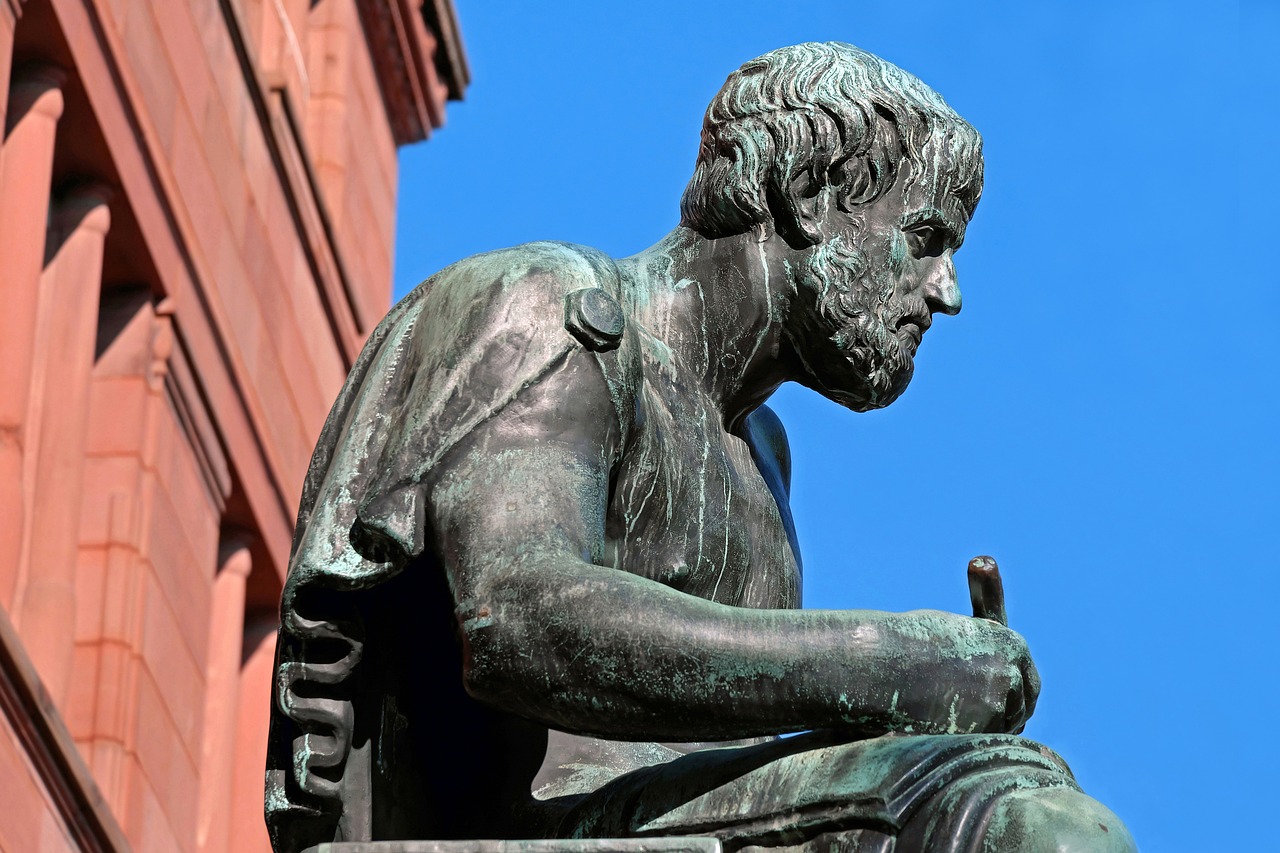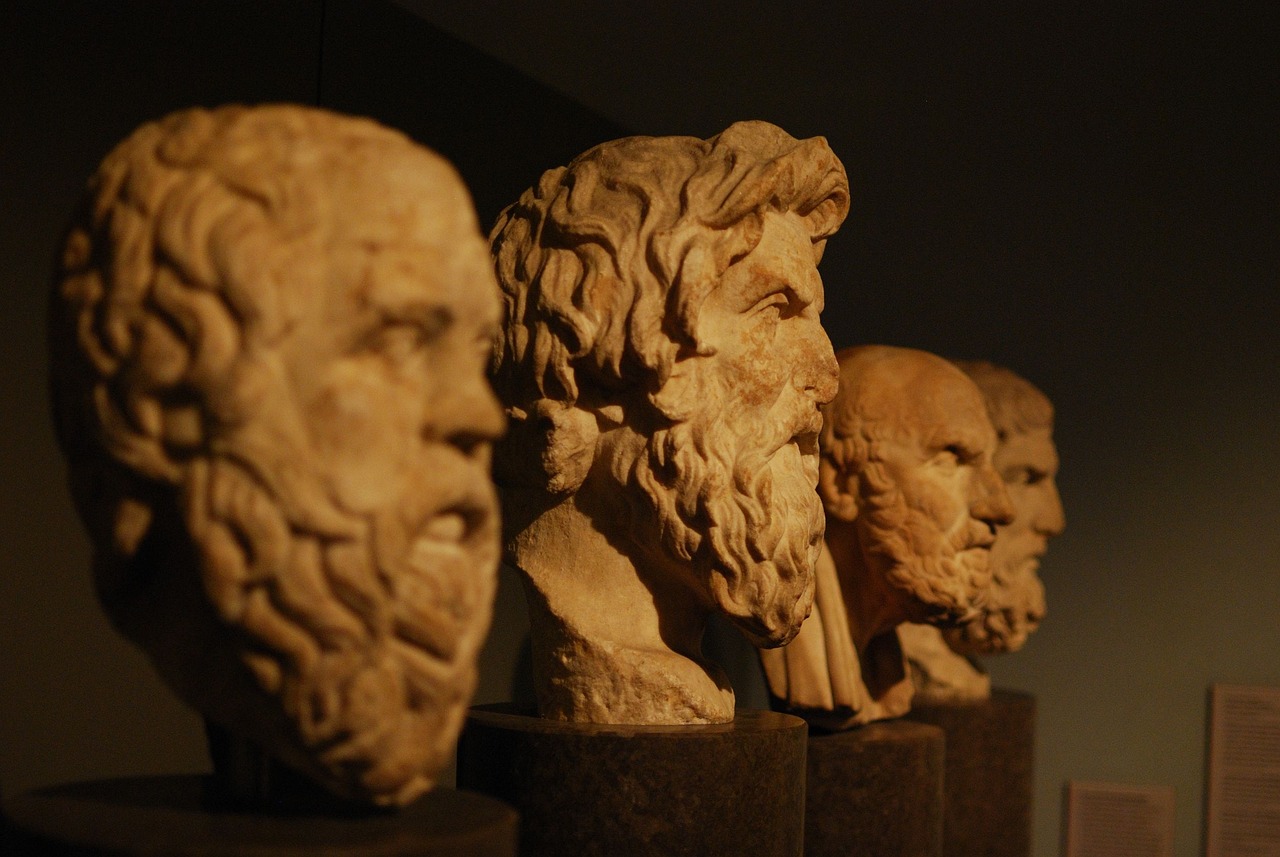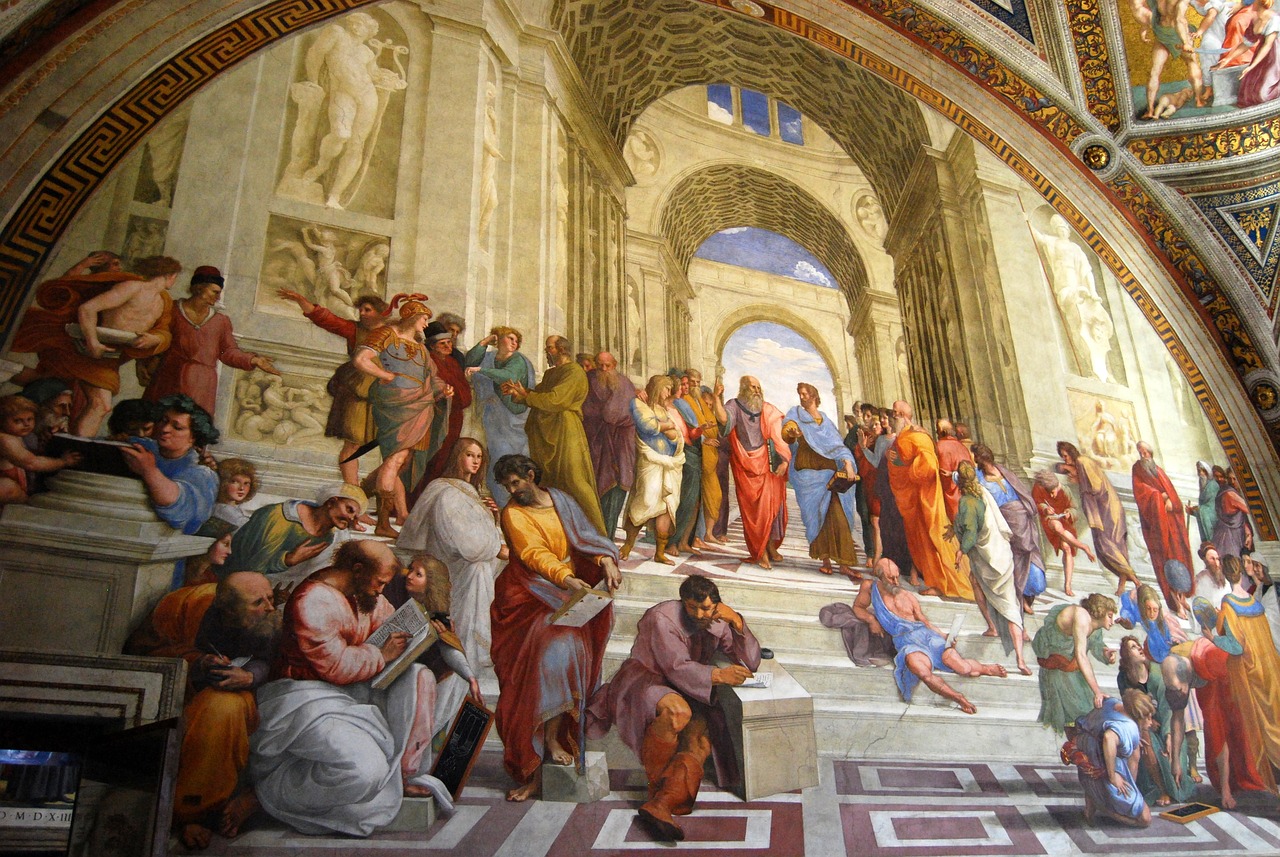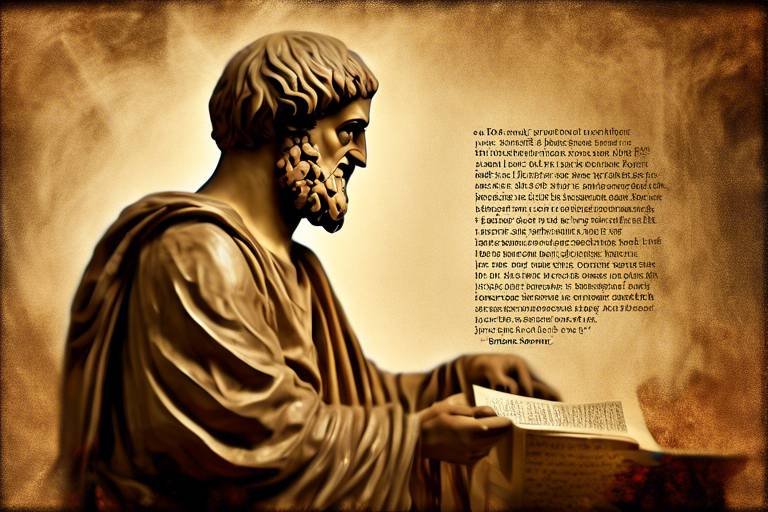Peripatetic Philosophy: Studying the Teachings of Aristotle
Welcome to the fascinating world of Peripatetic philosophy, where we dive deep into the rich teachings of one of history's greatest thinkers, Aristotle. Imagine walking through the vibrant streets of ancient Athens, where wisdom was exchanged like currency. Aristotle, a student of Plato, took the philosophical torch and ran with it, establishing a school known as the Lyceum. Here, he didn't just teach; he engaged with students in a dynamic way, encouraging them to question, observe, and understand the world around them. This article explores the core principles of Peripatetic philosophy, delving into Aristotle's teachings, methodologies, and their lasting impact on Western thought and education.
The origins of Peripatetic philosophy trace back to Aristotle himself, who founded the Lyceum in Athens. This was no ordinary school; it was a hub of intellectual activity where Aristotle shared his insights on various subjects, from ethics to biology. The historical context of Aristotle's work is crucial to understanding his philosophy. Influenced by the Socratic method of inquiry and the rich tapestry of Greek thought, Aristotle sought to create a system that was both comprehensive and practical. He believed that knowledge should not be an abstract concept but rather something that could be applied to everyday life. Through his teachings, he aimed to cultivate not just scholars, but well-rounded individuals capable of critical thought and ethical living.
Aristotle's teachings encompass a wide range of subjects, including ethics, metaphysics, and logic. His philosophical framework is defined by several core principles that continue to resonate today. For instance, Aristotle's belief in the importance of empirical observation laid the groundwork for the scientific method. He emphasized that to understand the world, one must first observe it. This approach is not just applicable to science but extends to everyday decision-making and ethical considerations. Aristotle's teachings encourage us to seek knowledge actively and apply it meaningfully in our lives.
At the heart of Aristotle's moral philosophy is the concept of virtue ethics. Unlike other ethical frameworks that focus on rules or consequences, virtue ethics emphasizes the importance of character and the cultivation of virtues. Aristotle defined virtue as a trait of character manifested in habitual action. This means that to be virtuous, one must practice virtuous behaviors consistently. Think of it like training for a marathon; the more you practice running, the better you become. Similarly, the more we engage in virtuous actions, the more virtuous we become. This idea is not just theoretical; it offers a practical roadmap for living a good and fulfilling life.
Aristotle emphasizes the significance of habituation in developing virtues. He believed that moral virtues are not innate but are developed through practice and repetition. Just as a musician hones their craft through countless hours of practice, individuals can cultivate virtues through consistent actions. This concept of habituation is vital because it suggests that anyone can become virtuous, provided they are willing to put in the effort. It’s about making small, everyday choices that align with our values, gradually shaping our character over time.
Another important distinction made by Aristotle is between intellectual virtues and moral virtues. Intellectual virtues pertain to the mind and include skills such as wisdom and understanding, while moral virtues relate to character traits like courage and temperance. Both types of virtues are essential for a well-rounded individual. Aristotle argued that intellectual virtues guide our reasoning and decision-making, while moral virtues shape our actions and interactions with others. Together, they create a balanced character capable of navigating the complexities of life.
Aristotle's empirical approach to knowledge is foundational to his philosophy. His methods of observation and classification were revolutionary for his time and laid the groundwork for scientific inquiry. He believed that to truly understand a subject, one must observe it in its natural context. This method is akin to a detective gathering clues to solve a mystery; the more evidence one collects, the clearer the picture becomes. Aristotle's insistence on observation and systematic study has influenced countless fields, from biology to political science, and continues to be a cornerstone of modern research methodologies.
The impact of Peripatetic philosophy extends far beyond Aristotle's lifetime. It has influenced various fields, shaping our understanding of science, ethics, and political theory throughout history. Aristotle's ideas were not confined to the walls of the Lyceum; they spilled over into the realms of education, governance, and moral reasoning. His teachings became a foundational element of Western thought, influencing thinkers from the Middle Ages to the Enlightenment and beyond.
During the Middle Ages, Aristotle's works were rediscovered and adapted by scholars. The translation of his texts into Latin opened up new avenues of thought, allowing his ideas to permeate medieval philosophy and theology. Scholars like Thomas Aquinas integrated Aristotle's teachings into Christian doctrine, demonstrating the versatility and enduring relevance of Peripatetic thought. This fusion of ideas helped shape the intellectual landscape of the time, bridging the gap between ancient wisdom and medieval scholarship.
Contemporary philosophers continue to engage with Aristotle's teachings, finding fresh perspectives and applications in today's ethical and scientific discussions. Modern interpretations often explore how Aristotle's ideas can inform current debates on morality, politics, and human behavior. For instance, the resurgence of virtue ethics in contemporary moral philosophy reflects a renewed interest in character and ethical living. Aristotle's insights remind us that philosophy is not just an academic pursuit; it is a practical guide for navigating the complexities of life.
- What is Peripatetic philosophy?
Peripatetic philosophy is a school of thought founded by Aristotle, focusing on empirical observation and the cultivation of virtues. - How did Aristotle influence modern science?
Aristotle's method of observation and classification laid the groundwork for the scientific method, influencing countless fields of study. - What are the main principles of Aristotle's ethics?
Aristotle's ethics emphasize virtue, habituation, and the importance of both intellectual and moral virtues in achieving a good life.

Origins of Peripatetic Philosophy
The can be traced back to the brilliant mind of Aristotle, who established the Lyceum in Athens around 335 BCE. This wasn't just any school; it was a vibrant hub of intellectual activity where Aristotle and his students engaged in discussions that would shape the very foundations of Western thought. To understand the significance of this movement, we need to explore the historical context in which Aristotle lived and the influences that molded his philosophical approach.
Aristotle was a student of Plato, whose ideas greatly influenced him, yet Aristotle diverged from his mentor in profound ways. While Plato emphasized the realm of forms and abstract ideals, Aristotle grounded his philosophy in the tangible world. This shift marked a significant turning point in philosophical inquiry, as Aristotle sought to understand the essence of things through observation and experience rather than pure speculation.
During Aristotle's time, Athens was a flourishing center of culture and knowledge, hosting a variety of schools of thought. The Sophists, for instance, were known for their rhetorical skills and relativistic views on truth. Aristotle's response to these ideas was to advocate for a more systematic approach to knowledge, one that involved rigorous analysis and empirical investigation. His method emphasized the importance of observation and classification, laying the groundwork for what we now consider the scientific method.
Furthermore, the political landscape of Athens played a crucial role in shaping Aristotle's philosophy. The city-state was characterized by its democratic ideals, which Aristotle both admired and critiqued. His thoughts on ethics and politics were heavily influenced by the societal norms of his time, leading him to explore the role of the individual within the community. This exploration would later become a cornerstone of his ethical framework, as he sought to define what it means to live a good life in a well-ordered society.
In summary, the origins of Peripatetic philosophy are deeply rooted in the interplay of historical, cultural, and intellectual currents of the time. Aristotle's unique approach to understanding the world not only set him apart from his contemporaries but also created a legacy that would influence countless generations of thinkers. The establishment of the Lyceum marked the beginning of a philosophical tradition that continues to resonate today, inviting us to question, observe, and engage with the world around us.

Core Principles of Aristotle's Teachings
Aristotle's teachings form a rich tapestry of thought that has profoundly influenced Western philosophy and education. His approach is not merely academic; it is a vibrant exploration of life, ethics, and the nature of existence. At the heart of his philosophy lies the belief that knowledge is not just about abstract concepts but is deeply intertwined with the practical realities of human life. This perspective invites us to engage with the world around us actively, seeking to understand and improve it.
One of the most compelling aspects of Aristotle's philosophy is his emphasis on empirical observation. Unlike his teacher Plato, who often relied on abstract forms and ideals, Aristotle grounded his teachings in the tangible world. He believed that knowledge begins with sensory experience and that we must observe and classify the world around us to gain true understanding. This method laid the groundwork for what we now recognize as the scientific method, emphasizing the importance of observation, experimentation, and evidence.
Another core principle of Aristotle's teachings is the notion of teleology, or the idea that everything has a purpose or end goal. He argued that understanding an object or a being requires understanding its purpose. For instance, the purpose of an acorn is to grow into an oak tree. This teleological perspective encourages us to look beyond mere existence and consider the potential and purpose inherent in all things. It also leads to his famous concept of the Golden Mean, which advocates for moderation in all aspects of life, suggesting that virtue lies between extremes.
Aristotle also delved deeply into ethics, particularly the concept of virtue ethics. He posited that the ultimate goal of human life is eudaimonia, often translated as "flourishing" or "the good life." For Aristotle, achieving eudaimonia is not about hedonistic pleasure but rather about living a life of virtue, which requires the development of good character traits. This is where his ideas about virtue come into play, as he believed that virtues are habits that we cultivate through practice and habituation.
To better understand Aristotle’s ethical framework, let’s break down some of the core components:
- Virtue as a Habit: Aristotle emphasized that virtues are not innate but developed through practice. Just as a musician hones their skills through repeated practice, individuals cultivate virtues through consistent actions.
- The Role of Reason: For Aristotle, rationality is crucial. He believed that true virtue involves using reason to govern our desires and actions, ensuring that we act in accordance with our highest self.
- Community and Relationships: Aristotle recognized that humans are social beings. He argued that our relationships and community play a significant role in shaping our character and ethical framework.
In addition to ethics, Aristotle's teachings extend to logic and metaphysics. He developed the first formal system of logic, which is still foundational in philosophical discourse today. His exploration of metaphysics, particularly the nature of being and existence, invites us to ponder profound questions about reality, causality, and the essence of things. Through his systematic approach, Aristotle sought to categorize knowledge into different fields, which has influenced the way we structure academic disciplines even in modern times.
Ultimately, the core principles of Aristotle's teachings invite us to engage with our world thoughtfully and purposefully. His emphasis on observation, purpose, virtue, and rationality not only shaped the intellectual landscape of his time but continues to resonate in contemporary discussions about ethics, science, and the nature of existence.

The Concept of Virtue Ethics
At the heart of Aristotle's moral philosophy lies the concept of virtue ethics, a framework that emphasizes the importance of character and the cultivation of virtues in achieving a good life. Unlike modern ethical theories that often focus on rules or consequences, virtue ethics asks a fundamental question: What kind of person should I be? Aristotle believed that by becoming virtuous individuals, we can lead fulfilling lives and contribute positively to society. But what exactly does it mean to be virtuous?
Aristotle defines virtue as a disposition to act in ways that benefit both the individual and society. He argues that virtues are not innate; rather, they are developed through habituation—the process of consistently practicing good behaviors until they become second nature. Imagine learning to ride a bike; at first, it feels awkward and challenging, but with practice, it transforms into a fluid, effortless skill. Similarly, virtues require ongoing effort and practice to cultivate.
In Aristotle's view, there are two primary types of virtues: moral virtues and intellectual virtues. Moral virtues, such as courage, temperance, and generosity, are concerned with our emotions and actions. They help us navigate our relationships and interactions with others. On the other hand, intellectual virtues, like wisdom and understanding, pertain to our reasoning and cognitive abilities. Together, these virtues form a holistic approach to ethics, where the development of character is just as important as intellectual growth.
To illustrate this further, consider the following table that contrasts moral and intellectual virtues:
| Type of Virtue | Definition | Examples |
|---|---|---|
| Moral Virtues | Dispositions that govern our actions and emotions | Courage, Temperance, Justice |
| Intellectual Virtues | Dispositions related to our reasoning and understanding | Wisdom, Knowledge, Insight |
So, how do we cultivate these virtues? Aristotle suggests that it starts with self-awareness and a commitment to personal growth. By reflecting on our actions and striving for balance, we can develop our moral compass. For instance, consider the virtue of courage; it lies between the extremes of recklessness and cowardice. By practicing courage in small, everyday situations, we can gradually build our capacity for bravery in more significant challenges.
In summary, virtue ethics is not merely about following rules or seeking outcomes; it’s about becoming the best version of ourselves. Aristotle's teachings remind us that the journey toward virtue is ongoing and requires dedication. As we strive to embody these virtues, we not only enhance our own lives but also inspire others to do the same, creating a ripple effect of goodness in our communities.

The Role of Habituation
When it comes to Aristotle's philosophy, the concept of habituation plays a pivotal role in shaping one's virtues. Imagine trying to learn how to ride a bike. At first, it feels awkward and clumsy, but with practice, you find your balance and can ride smoothly. This is much like how Aristotle views the development of virtues. He argues that virtues are not innate; rather, they are cultivated through consistent practice and repetition. In his view, becoming virtuous is akin to mastering a skill—it's all about practice makes perfect.
Aristotle believed that by repeatedly engaging in virtuous actions, individuals gradually develop a stable character. He famously stated, “We are what we repeatedly do. Excellence, then, is not an act, but a habit.” This highlights the idea that our moral character is shaped over time through our actions. Just as a sculptor chisels away at a block of marble to reveal a beautiful statue, so too do we mold our character through our daily choices and behaviors.
To further understand this concept, let’s break down the process of habituation into a few key components:
- Consistency: Regularly performing virtuous actions reinforces the behavior, making it more natural over time.
- Reflection: Taking time to reflect on our actions helps us understand their impact and reinforces our commitment to virtuous living.
- Community: Surrounding ourselves with others who embody virtues can inspire and motivate us to adopt similar behaviors.
In essence, habituation is not just about doing good things; it's about creating a lifestyle that fosters virtue. Aristotle emphasizes that this process requires deliberate effort and commitment. For example, if someone wants to cultivate the virtue of generosity, they might start by making small, consistent contributions to their community. Over time, these actions become second nature, and the individual becomes known for their generosity.
Moreover, Aristotle distinguishes between two types of habits: good habits and bad habits. While good habits lead to the development of virtues, bad habits can lead to vices. This duality emphasizes the importance of being mindful about the habits we cultivate. It’s like tending to a garden; if we don’t regularly pull out the weeds (bad habits), they can overtake the flowers (good habits).
In conclusion, habituation is a fundamental aspect of Aristotle's philosophy. It illustrates how we can actively shape our character and moral compass through our choices and actions. By understanding and embracing the role of habituation, we can strive to become the best versions of ourselves, one virtuous action at a time.
- What is habituation in Aristotle's philosophy? Habituation refers to the process of developing virtues through consistent practice and repetition of virtuous actions.
- How can I apply habituation in my daily life? You can apply habituation by setting small, achievable goals related to virtues you want to cultivate, reflecting on your actions, and surrounding yourself with positive influences.
- Are virtues innate or learned? According to Aristotle, virtues are not innate; they are learned and developed through habituation.

Intellectual Virtues vs. Moral Virtues
When diving into Aristotle's philosophy, one of the most intriguing aspects is his distinction between intellectual virtues and moral virtues. At first glance, it might seem like they're just two sides of the same coin, but understanding their differences can really illuminate how we think about character and knowledge. Intellectual virtues are all about the mind—think of them as the tools we use to navigate the world of ideas and understanding. They include traits like wisdom, understanding, and scientific knowledge. These virtues help us grasp complex concepts, analyze situations critically, and make informed decisions.
On the other hand, moral virtues pertain to our character and how we interact with others. They're the qualities that guide our actions and decisions in the moral realm. Examples include courage, temperance, and justice. While intellectual virtues might help us understand what is right, moral virtues empower us to act on that understanding. Aristotle believed that both types of virtues are essential for a well-rounded individual, but they serve different purposes in our lives.
To better illustrate the differences, consider the following table:
| Type of Virtue | Description | Examples |
|---|---|---|
| Intellectual Virtues | Traits that enhance our cognitive abilities and understanding. | Wisdom, Understanding, Scientific Knowledge |
| Moral Virtues | Qualities that guide our ethical behavior and interactions with others. | Courage, Temperance, Justice |
Now, you might be wondering, how do these virtues interact with each other? Well, Aristotle believed that intellectual virtues can inform our moral virtues. For example, having a deep understanding of justice can lead to more just actions. Conversely, practicing moral virtues can enhance our intellectual virtues. When we act with courage, we often gain deeper insights into our values and principles.
In essence, Aristotle's framework encourages us to cultivate both types of virtues. By doing so, we not only become more knowledgeable individuals but also better human beings. So, the next time you find yourself faced with a moral dilemma, remember that it's not just about knowing what's right; it's about having the character to do it!

Aristotle's Method of Inquiry
Aristotle's method of inquiry is nothing short of revolutionary, laying the groundwork for modern scientific thought. Unlike his predecessors, who often relied on abstract reasoning and speculation, Aristotle championed a more empirical approach. He believed that knowledge should be derived from direct observation and experience, a principle that resonates strongly in today's scientific methodologies.
At the heart of Aristotle's inquiry lies the concept of observation. He meticulously studied the natural world, documenting his findings on a variety of subjects, from biology to ethics. For Aristotle, the world was not just a backdrop for philosophical musings; it was a rich tapestry of phenomena waiting to be understood. He employed a systematic approach, categorizing his observations into classifications that allowed for deeper analysis. This method not only helped in understanding the complexities of the natural world but also set a precedent for future scientific exploration.
One of Aristotle's significant contributions to the method of inquiry is his emphasis on causality. He proposed that understanding the causes of phenomena is essential for comprehending their nature. Aristotle articulated four types of causes:
| Type of Cause | Description |
|---|---|
| Material Cause | The substance out of which something is made. |
| Formal Cause | The form or arrangement of a thing. |
| Efficient Cause | The agent or mechanism that brings something into being. |
| Final Cause | The purpose or end for which a thing exists. |
This framework of causality allowed Aristotle to analyze not just what things are, but why they are, providing a more comprehensive understanding of the world. His method encouraged questioning and critical thinking, urging scholars to ask not just "what" but "why" and "how." This inquiry-based approach is foundational to the scientific method we utilize today.
Moreover, Aristotle's method was characterized by a commitment to classification. He categorized living organisms based on their similarities and differences, effectively laying the groundwork for biological taxonomy. This classification system is still relevant, as it helps scientists communicate and understand the diversity of life on Earth. By observing, classifying, and analyzing, Aristotle's method fostered a deeper appreciation for the interconnectedness of all things.
Ultimately, Aristotle's method of inquiry is a testament to the power of curiosity and the human desire to understand our surroundings. His legacy lives on, inspiring countless generations of thinkers and scientists to explore the world with an open mind and a critical eye. As we continue to navigate the complexities of existence, Aristotle's principles remind us that knowledge is not just about answers but about the questions we dare to ask.

The Influence of Peripatetic Philosophy
The influence of Peripatetic philosophy is like a ripple in a pond, extending far beyond the initial splash that was Aristotle's teachings. From the moment Aristotle founded the Lyceum in Athens, he set in motion a wave of intellectual exploration that would touch various fields, including science, ethics, and political theory. His approach to understanding the world was not just theoretical; it was deeply practical, emphasizing observation and experience. This empirical method became a cornerstone for future scholars and thinkers, shaping the very fabric of Western thought.
As we delve into the historical impact of Aristotle's ideas, it's essential to recognize that his teachings didn't just fade away after his death. Instead, they sparked a renaissance of thought during the Middle Ages. Scholars such as Thomas Aquinas and Avicenna revisited and adapted Aristotle's works, weaving them into the tapestry of medieval philosophy and theology. This revival was crucial, as it helped bridge the gap between ancient Greek philosophy and modern thought, paving the way for the Renaissance and the Scientific Revolution.
Moreover, the influence of Peripatetic philosophy can be seen in various disciplines even today. For instance, in ethics, Aristotle's concept of virtue ethics continues to resonate. It challenges us to consider not just what actions are right or wrong, but who we are becoming as individuals. This focus on character and moral development has sparked a renewed interest in virtue ethics among contemporary philosophers and ethicists, as they explore its application in modern dilemmas.
In the realm of science, Aristotle's method of inquiry laid the groundwork for what we now consider the scientific method. His emphasis on observation and classification has influenced countless generations of scientists. Today, we still rely on empirical evidence and systematic experimentation, principles that can be traced back to his teachings. This enduring legacy underscores the relevance of Aristotle's work, as it continues to inform research methodologies across various fields.
To illustrate the broad influence of Peripatetic philosophy, consider the following table that highlights key areas affected by Aristotle's teachings:
| Field | Influence |
|---|---|
| Science | Foundation of the scientific method; emphasis on observation and classification. |
| Ethics | Development of virtue ethics; focus on character and moral virtues. |
| Political Theory | Concepts of justice and the role of citizens in governance. |
| Metaphysics | Exploration of being, substance, and causality. |
In summary, the influence of Peripatetic philosophy is profound and far-reaching. It has shaped not only the course of Western philosophy but also the methodologies and ethical frameworks that guide us today. As we continue to grapple with complex issues in science, ethics, and politics, Aristotle's insights remain a vital source of wisdom. His teachings remind us that the pursuit of knowledge is not merely an academic endeavor but a lifelong journey toward understanding ourselves and the world around us.
- What is Peripatetic philosophy?
Peripatetic philosophy refers to the teachings of Aristotle and his followers, emphasizing empirical observation and practical ethics. - How did Aristotle influence modern science?
Aristotle's method of inquiry laid the groundwork for the scientific method, focusing on observation and classification. - What is virtue ethics?
Virtue ethics is a moral philosophy that emphasizes character and virtues as central to ethical behavior, a concept strongly advocated by Aristotle. - Why is Aristotle's work relevant today?
Aristotle's insights continue to inform contemporary discussions in ethics, science, and political theory, making his work timeless and applicable.

Peripatetic Philosophy in the Middle Ages
The Middle Ages were a fascinating period for the evolution of philosophical thought, particularly regarding the teachings of Aristotle and the Peripatetic tradition. Following a period of relative obscurity after Aristotle's death, his works experienced a remarkable resurgence in the medieval era, primarily through the efforts of scholars in the Islamic world and later in Europe. This revival was not merely a rediscovery; it was a profound transformation that shaped the intellectual landscape of the time.
During this period, Aristotle's texts were translated into Latin, making them accessible to a broader audience. The translation movement, particularly in the 12th century, was pivotal. Scholars such as Avicenna and Averroes played crucial roles in interpreting and commenting on Aristotle's works. Their contributions helped bridge the gap between ancient Greek philosophy and medieval thought, allowing Aristotle's ideas to permeate various fields such as theology, science, and ethics.
One of the most significant impacts of Peripatetic philosophy during the Middle Ages was its integration into Christian theology. Thinkers like Thomas Aquinas took Aristotle's principles and wove them into the fabric of Christian doctrine. Aquinas's synthesis of Aristotelian philosophy with Christian teachings laid the groundwork for what is now known as Scholasticism. This approach emphasized reason and faith as complementary, allowing for a more comprehensive understanding of the divine. Aquinas famously stated, "Grace perfects nature," highlighting the harmony between Aristotle's natural philosophy and Christian beliefs.
Interestingly, the influence of Aristotle was not without controversy. His ideas sparked debates among medieval scholars, particularly regarding the nature of the universe and the existence of God. Some theologians argued that Aristotle's emphasis on empirical observation contradicted the faith-based understanding of the world. This tension led to a rich dialogue, where scholars were compelled to defend or critique Aristotelian principles, thus advancing philosophical discourse. For instance, the University of Paris became a hotbed for these discussions, with scholars like William of Ockham challenging Aristotelian logic and advocating for a more nominalist approach.
In addition to theology, the Peripatetic philosophy also had a profound impact on the development of science during the Middle Ages. Aristotle’s method of inquiry, particularly his emphasis on observation and classification, laid the groundwork for the scientific method. Scholars began to adopt a more systematic approach to studying the natural world, leading to significant advancements in fields such as medicine, astronomy, and physics. The establishment of universities in Europe further facilitated this intellectual growth, as students were taught to engage critically with Aristotelian texts.
Ultimately, the Peripatetic revival in the Middle Ages was not just about preserving Aristotle's teachings; it was about reinterpreting and expanding them. The integration of these ideas into various disciplines created a vibrant intellectual culture that would influence the Renaissance and beyond. The legacy of Aristotle and his followers can still be felt today, as many of their concepts continue to resonate in modern philosophical and scientific discussions.
- What is Peripatetic philosophy?
Peripatetic philosophy refers to the teachings and ideas developed by Aristotle and his followers, emphasizing empirical observation and logical reasoning.
- How did Aristotle influence medieval thought?
Aristotle's works were rediscovered and integrated into Christian theology and medieval philosophy, shaping the intellectual landscape of the time.
- Who were key figures in the revival of Aristotle's philosophy during the Middle Ages?
Scholars like Avicenna, Averroes, and Thomas Aquinas played crucial roles in interpreting and adapting Aristotle's teachings for medieval thought.

Modern Interpretations of Aristotle's Ideas
Fast forward to the 21st century, and Aristotle's ideas are still buzzing with relevance, like a classic tune that never goes out of style. Modern philosophers, ethicists, and scientists are diving into his teachings, reinterpreting them through contemporary lenses. So, what exactly are these interpretations, and why do they matter? Let's break it down!
One of the most exciting aspects of Aristotle's philosophy is its adaptability. Think of his ideas as a sturdy tree with deep roots; they can withstand storms and still flourish. For instance, in ethics, the concept of virtue ethics has seen a resurgence. Today’s ethicists are exploring how Aristotle's focus on character and moral virtues can inform our understanding of ethical behavior in a complex world. Instead of just following rules, modern interpretations encourage us to cultivate virtues that lead to genuine human flourishing.
Moreover, Aristotle's emphasis on empirical observation has paved the way for scientific inquiry. His method of classifying knowledge and seeking evidence resonates with the scientific method used today. In fields such as psychology and social sciences, researchers often draw from Aristotle's ideas to frame their studies. For instance, the way Aristotle categorized different forms of knowledge can be seen in modern disciplines that emphasize interdisciplinary approaches.
But it doesn’t stop there! Aristotle's thoughts on politics and ethics are being reexamined in light of current social issues. Think about the challenges we face today—climate change, social justice, and political polarization. Scholars are revisiting Aristotle's notions of the common good and civic responsibility to find solutions that resonate with contemporary society. His idea that humans are inherently social beings is more relevant than ever, reminding us that our actions impact not just ourselves but also our communities.
In educational contexts, Aristotle's philosophy of learning through experience and critical thinking is gaining traction. Educators are realizing that fostering a love for learning, rather than rote memorization, can lead to more engaged and thoughtful students. This approach aligns with Aristotle's belief that education should cultivate both the mind and character, preparing individuals to contribute positively to society.
To summarize, modern interpretations of Aristotle's ideas are rich and varied, bridging the gap between ancient wisdom and contemporary challenges. His teachings encourage us to reflect on our virtues, engage in empirical inquiry, and consider our roles as responsible citizens. As we navigate the complexities of today's world, Aristotle's insights serve as a guiding light, reminding us of the enduring power of philosophy.
- What is the main focus of Aristotle's philosophy? Aristotle's philosophy primarily focuses on ethics, metaphysics, logic, and politics, emphasizing the importance of virtue and empirical observation.
- How does virtue ethics relate to modern ethical discussions? Virtue ethics emphasizes character and moral virtues over strict rule-following, making it relevant in discussions about personal integrity and societal well-being.
- In what ways has Aristotle influenced modern science? Aristotle's method of empirical observation and classification laid the groundwork for the scientific method, influencing various fields, including psychology and sociology.
- Why is Aristotle's concept of the common good important today? It encourages individuals to consider their responsibilities to society, promoting social justice and community engagement in addressing contemporary issues.
Frequently Asked Questions
- What is Peripatetic philosophy?
Peripatetic philosophy refers to the teachings and methodologies established by Aristotle, who founded the Lyceum in Athens. It emphasizes empirical observation and logical reasoning, exploring various subjects like ethics, metaphysics, and logic.
- How did Aristotle's teachings influence Western thought?
Aristotle's teachings laid the groundwork for many fields, including science, ethics, and political theory. His ideas have been pivotal in shaping Western philosophy and continue to be relevant in modern discussions.
- What is the significance of virtue ethics in Aristotle's philosophy?
Virtue ethics is central to Aristotle's moral philosophy. He posits that achieving a good and fulfilling life hinges on developing virtues, which are cultivated through consistent practice and habituation.
- What is the difference between intellectual and moral virtues?
Aristotle distinguishes between intellectual virtues, which pertain to the mind and knowledge, and moral virtues, which relate to character and behavior. Both types of virtues are essential for achieving overall virtue and living a balanced life.
- How did Aristotle's method of inquiry contribute to science?
Aristotle's empirical approach to knowledge—emphasizing observation and classification—was foundational for scientific inquiry. His methods encouraged systematic investigation and laid the groundwork for future scientific methods.
- What impact did Peripatetic philosophy have during the Middle Ages?
During the Middle Ages, Aristotle's works were rediscovered and adapted by scholars, significantly influencing medieval philosophy and theology. His ideas were integrated into the teachings of the Church and shaped religious thought.
- How are Aristotle's ideas interpreted in modern philosophy?
Contemporary philosophers engage with Aristotle's teachings, applying his principles to current ethical dilemmas and scientific debates. His insights on virtue and inquiry continue to inspire discussions in various fields today.



















